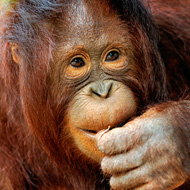Early human speech linked to orangutans

"It has been presumed that sounds made by great apes are driven by arousal over which they have no control, but our research proves that orangutans have the potential capacity to control the action of their voices" (stock photo)
International research has revealed major links between the evolution of human speech and voice control in orangutans.
Rocky, an 11-year-old orangutan, was studied at Indianapolis Zoo, between April and May 2012, during which time researchers went to great lengths not to disrupt his regular routine.
The team encouraged Rocky (who was eight years old at the time) to play an imitation game, through which he would copy the pitch and tone of vowel-like calls and sounds made by researchers. Rocky’s ability to mimic the random sounds, with the varied tones and pitches, reveal a level of voice control unknown in orangutans, until now.
Rocky’s sounds were compared with a database of over 12,000 sounds made by both captive and wild orangutans. Based on this comparison researchers were able to conclude that Rocky’s sounds were different to any of those heard on the database, therefore showing that he was able to control his voice in a conversational context and learn new sounds.
Dr Adriano Lameira, lead author of the study, stated: "Instead of learning new sounds, it has been presumed that sounds made by great apes are driven by arousal over which they have no control, but our research proves that orangutans have the potential capacity to control the action of their voices.
"This indicates that the voice control shown by humans could derive from an evolutionary ancestor with similar voice control capacities as those found in orangutans and in all great apes more generally."
Professor Serge Wich, of the University of Amsterdam, added: "Our findings indicate that the excellent vocal control that humans exhibit likely derives from an evolutionary ancestor with similar capacities in terms of voice control as those found in orangutans, and possibly in all great apes more generally.
"Based on these findings, science can now start to reconstruct the vocal capacities of an early hominid, estimated to have lived before the split between the orangutan and the human lineages, and examine the following steps in the evolution of the vocal system towards full-blown speech."



 The veterinary mental health charity Vetlife is inviting the veterinary community to join it for a sponsored cold-water dip.
The veterinary mental health charity Vetlife is inviting the veterinary community to join it for a sponsored cold-water dip.